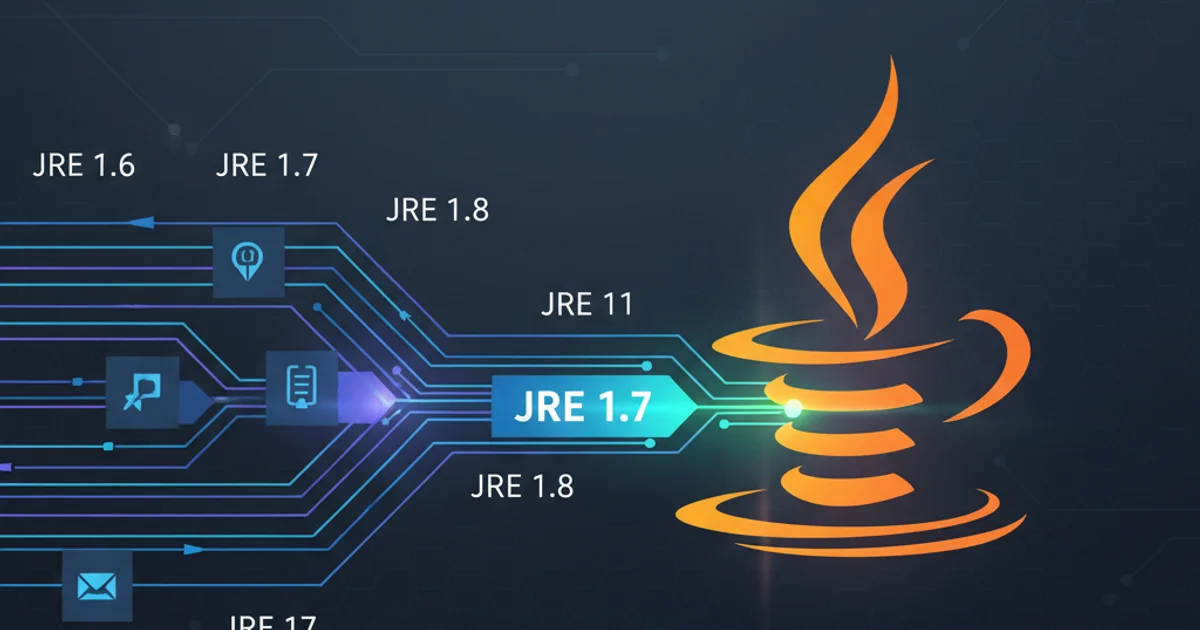What jre is required for an application written in java 1.7?
Categories:
Understanding Java 1.7 Application Compatibility: Which JRE Do You Need?

Explore the Java Runtime Environment (JRE) requirements for applications built with Java 1.7 (Java 7), including forward and backward compatibility considerations and best practices for deployment.
When deploying or running an application developed with a specific Java Development Kit (JDK) version, understanding the corresponding Java Runtime Environment (JRE) requirements is crucial. This article focuses on applications written in Java 1.7 (also known as Java 7) and clarifies which JRE versions are suitable for their execution. We'll cover the fundamental compatibility rules, potential pitfalls, and recommended practices to ensure smooth operation.
The Core Compatibility Rule: JRE Version Must Be Equal or Newer
The most fundamental rule for Java application compatibility is that an application compiled with a specific JDK version requires a JRE of the same version or newer to run correctly. This principle ensures that all necessary classes, APIs, and JVM features used during compilation are available at runtime.
For an application written and compiled using Java 1.7 (JDK 7), the minimum required JRE is Java 1.7 (JRE 7). Attempting to run a Java 1.7 application on an older JRE, such as JRE 6 or JRE 5, will almost certainly result in runtime errors, typically UnsupportedClassVersionError or NoSuchMethodError, because the older JRE lacks the features or bytecode version support introduced in Java 7.
flowchart TD
A["Application Compiled with JDK 7"] --> B{"Required JRE Version?"}
B -->|JRE 6 or Older| C["Error: UnsupportedClassVersionError"]
B -->|JRE 7| D["Runs Successfully"]
B -->|JRE 8 or Newer| DJava Application Compatibility Flow
Forward Compatibility: Running Java 1.7 on Newer JREs
Java is renowned for its strong forward compatibility. This means that applications compiled with an older JDK version are generally expected to run without issues on newer JRE versions. Therefore, a Java 1.7 application will typically run perfectly fine on JRE 8, JRE 11, JRE 17, or even the latest JRE versions.
This forward compatibility is a cornerstone of Java's 'write once, run anywhere' philosophy. However, there are rare exceptions, primarily due to:
- Deprecated or Removed APIs: While rare for minor version jumps, significant API changes or removals in newer Java versions could theoretically impact an application if it relies heavily on such deprecated features. For Java 7 to Java 8+, this is generally not a major concern for most applications.
- Internal API Usage: If the application uses internal, non-public APIs of the JVM, these might change or be removed in newer JREs, leading to issues.
- Behavioral Changes: Subtle behavioral changes in the JVM or standard library might occasionally expose bugs in an application that were not apparent on the original JRE version.
Backward Compatibility: Why Older JREs Won't Work
Backward compatibility, meaning running an application compiled with a newer JDK on an older JRE, is generally not supported in Java. This is because each new Java version introduces new language features, API enhancements, and bytecode format changes. An older JRE simply doesn't understand the bytecode generated by a newer JDK.
For instance, if you compile a Java 1.7 application, the bytecode will have a specific version (e.g., major version 51 for Java 7). An older JRE (like JRE 6, which supports major version 50) will encounter an UnsupportedClassVersionError because it doesn't recognize the bytecode format. This error message is a clear indicator that your JRE is too old for the compiled application.
java -version
# Example output for JRE 6:
# java version "1.6.0_45"
# Java(TM) SE Runtime Environment (build 1.6.0_45-b06)
# Java HotSpot(TM) 64-Bit Server VM (build 20.45-b01, mixed mode)
# Example output for JRE 7:
# java version "1.7.0_80"
# Java(TM) SE Runtime Environment (build 1.7.0_80-b15)
# Java HotSpot(TM) 64-Bit Server VM (build 24.80-b11, mixed mode)
Checking your installed Java Runtime Environment (JRE) version.
UnsupportedClassVersionError.Recommended JRE for Java 1.7 Applications
For optimal compatibility and stability, the ideal JRE for a Java 1.7 application is JRE 7 itself. This ensures that the runtime environment exactly matches the development environment. However, given that Java 7 is an older, unsupported version, running it on a newer, actively maintained JRE is often a more secure and practical approach.
Recommendations:
- JRE 7 (Minimum): If you must stick to the exact version, JRE 7 is the absolute minimum. Be aware that Java 7 is End-of-Life (EOL) and no longer receives public security updates.
- JRE 8 (Recommended): JRE 8 is a very common and stable choice. It offers excellent forward compatibility for Java 7 applications and is still widely supported, though its public support has also ended, with commercial support available.
- Newer JREs (e.g., JRE 11, JRE 17): Most Java 7 applications will run on modern JREs like Java 11 (LTS) or Java 17 (LTS). This is often the best long-term strategy for security and performance, provided thorough testing is conducted.
1. Identify Current JRE
Open a terminal or command prompt and run java -version to determine the currently active JRE on your system.
2. Check Application Requirements
Confirm the Java version used to compile your application. If it's Java 1.7, proceed to the next step.
3. Select Compatible JRE
Choose a JRE version that is 1.7 or newer. For production, consider JRE 8 or a modern LTS version like JRE 11 or JRE 17 for security and performance benefits.
4. Test Thoroughly
Before deployment, rigorously test your Java 1.7 application on the chosen JRE version to ensure full compatibility and identify any unexpected issues.